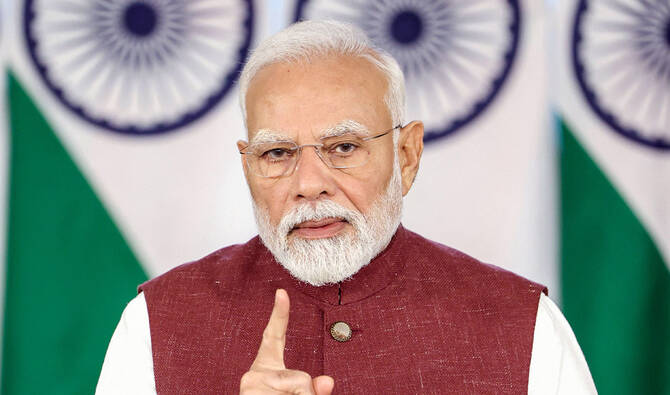NEW DELHI: Indian Prime Minister Narendra Modi said on Monday India has only “paused its military action” against Pakistan and would “retaliate on its own terms” if there is any future militant attack on the country.
His comments were the first since Saturday’s understanding between India and Pakistan to stop all military actions on land, in the air and at the sea in a US-brokered ceasefire.
The escalating hostilities between the two nuclear-armed rivals after a deadly attack on tourists in Kashmir had threatened regional peace.
“We will be monitoring every step of Pakistan,” Modi said in an address to the nation, adding that India won’t “tolerate nuclear blackmailing” by Pakistan and would take stern action for any future terror attack.
“This is not an era of war, but this is not an era of terrorism either. There should be zero tolerance for terrorism,” Modi said.
The PM’s comments come from as Indian and Pakistani authorities both said Monday there was no firing reported overnight along the heavily militarized region between their countries, the first time in recent days the two nations were not shooting at each other.
“The night remained largely peaceful across Jammu and Kashmir, and other areas along the international border,” the Indian army said in a statement, adding that no incidents had been reported.
Senior military officials from India and Pakistan spoke via a hotline on Monday, the state-run Pakistan Television reported. It gave no details, but the two sides were to assess if the ceasefire was holding and how to ensure its implementation. There were fears it would not hold after they accused each other of violations just hours after it was announced.
Local government officials in Pakistan-administered Kashmir, called Azad Kashmir, reported no incidents of cross-border firing along the Line of Control and said that civilians displaced by recent skirmishes between Pakistani and Indian forces were returning to their homes.
Pakistan’s military spokesperson, Lt. Gen. Ahmad Sharif, said late Sunday that Pakistan remains committed to upholding the ceasefire and will not be the first to violate it.
Soon after the ceasefire announcement on Saturday, Pakistan reopened all of its airports and restored flight operations. India followed up Monday with reopening of all the 32 airports that were shut temporarily across northern and western regions due to the flare up in tensions.
“It’s informed that these airports are now available for civil aircraft operations with immediate effect,” the Airports Authority of India said in a statement.
The militaries of the two countries have been engaged in one of their most serious confrontations in decades since last Wednesday, when India struck targets inside Pakistan it said were affiliated with militants responsible for the massacre of 26 tourists in Indian-controlled Kashmir. The tourists, mostly Indian Hindu men, were brutally killed in front of their families in the meadow town of Pahalgam last month.
India accused Pakistan of backing the militants who carried out the massacre, a charge Islamabad denied. The incident first led to a spat of tit-for-tat diplomatic measures by both the nations, sending their bilateral ties to a near historic low.
The two expelled each other’s diplomats, shut their airspace, land borders, and suspended a crucial water treaty.
After Wednesday’s strikes in Pakistan, both sides exchanged heavy fires along their de facto border in the restive Kashmir region followed by missile and drone strikes into each other’s territories, mainly targeting military installations and air bases. Dozens of civilians were killed on both the sides in heavy shelling, the two countries said.
The Indian military on Sunday for the first time claimed its strikes into Azad Kashmir and Pakistan last week killed more than 100 militants, including prominent leaders.
Lt. Gen. Rajiv Ghai, the director general of India’s military operations, said India’s armed forces struck nine militant infrastructure and training facilities, including sites of the Lashkar-e-Taiba group that India blames for carrying out major militant strikes in India and the disputed region of Kashmir.
Ghai said at least 35 to 40 Pakistani soldiers were killed in clashes along the Line of Control, the de facto border that divides the disputed Kashmir region between India and Pakistan. Five Indian soldiers were also killed, he said.
Pakistan’s Information Minister Attaullah Tarar on Thursday said his country’s armed forces had killed 40 to 50 Indian soldiers along the Line of Control. Pakistani military also claimed to have shot down five Indian fighter jets and inflected heavy losses on Indian military installations by targeting 26 locations in India.
The Associated Press couldn’t independently verify the claims made by India and Pakistan.
Air Chief Marshal AK Bharti, the director general India’s air operations told a news conference on Monday that despite “minor damage (s) incurred, all our military bases and air defense systems continue to remain fully operational, and ready to undertake any further missions, should the need so arise.”
Bharti reiterated that New Delhi’s fight was “with terrorists, and not with Pakistan military or its civilians.”
















